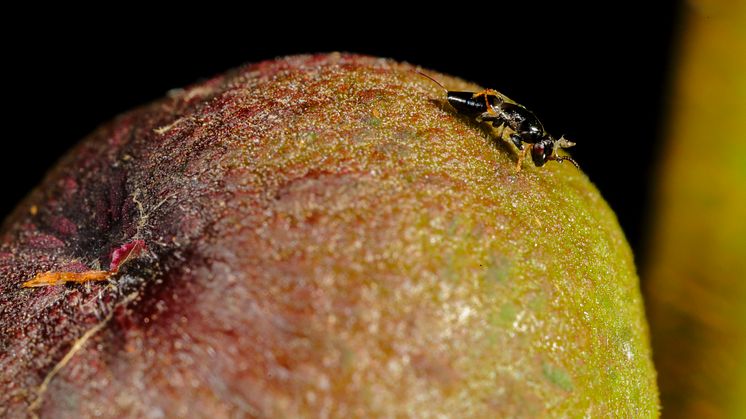
Press release -
Higher temperatures make it difficult for fig tree pollinators
Researchers from Uppsala University and elsewhere have been studying the effect of rising temperatures on the lifespan of pollinating fig wasps. The findings show that the wasps lived much shorter lives at high temperatures, which would make it difficult for them to travel the long distances between the trees they pollinate.
Fig trees are very important components of tropical forests around the world, as they ensure there is a food source for forest birds and mammals, even during periods when other plants do not bear fruit. Fig trees produce fruit all year round, but only if the fig is first visited by its pollinating fig wasp. Each species of fig tree is pollinated by its own species of fig wasp. Fig wasps are only two to three millimetres long and live an average of two to three days, but often fly 10 kilometres or more to get from a ripe tree to a flowering tree.
Global warming is expected to lead to temperature increases worldwide, including in tropical regions. In the area of Panama that the researchers focused on, the UN Intergovernmental Panel on Climate Change predicts a temperature rise of one to four degrees by 2100. The research group looked at what happens to the lifespan of fig wasps if temperatures rise that much.
The researchers used experiments in which the fig wasps were allowed to spend their entire adult lives in carefully controlled temperatures. All five pollinator fig wasp species studied lived shorter lives at higher temperatures. When the temperature rose to 36 degrees, the wasps only lived an average of two to ten hours.
In addition to a warmer future shortening the lifespan of the wasps, deforestation of tropical forests is increasing the distance between fig trees, which also makes pollination more difficult. Possibly fig wasps might be able to avoid higher temperatures by adapting their behaviour, such as flying at night when it is cooler. If the fig wasps are no longer able to pollinate, fig trees will not be able to produce fruit. This could have major consequences for all animals in tropical forests that depend on figs for food.
During the study, ripe figs were collected from five different species of fig trees: Ficus obtusifolia, Ficus citrifolia, Ficus popenoei, Ficus insipida and Ficus maxima. The figs were opened in the lab, and the wasps that had developed inside the figs were kept in climate chambers at different temperatures. The number of wasps still alive was counted about every four hours. In total, the researchers tested over 40 000 wasps from about 400 figs.
For further information, please contact:
Lisette van Kolfschoten, PhD student at the Department of Ecology and Genetics, Uppsala University, email: Lisette.vankolfschoten@ebc.uu.se, +46 707345860 (English, Dutch)
Charlotte Jandér, Assistant Professor at the Department of Ecology and Genetics, Uppsala University email: Charlotte.jander@ebc.uu.se (English, Swedish)
Reference: Lisette van Kolfschoten, Lovisa Dück, Martin I. Lind, K. Charlotte Jandér (2022) Rising temperatures threaten pollinators of fig trees—Keystone resources of tropical forests, Ecology and Evolution, DOI: 10.1002/ece3.9311
Funding from: Wenner-Gren Foundations (2015 to KCJ) & Stiftelsen Extensus (2016 and 2017 to KCJ).
Topics
Categories
Uppsala University
The first University in Sweden. Quality, knowledge, and creativity since 1477. Education and research of the highest quality and relevance to society, business, and culture. Uppsala University is ranked among the world’s top higher education institutions. www.uu.se
